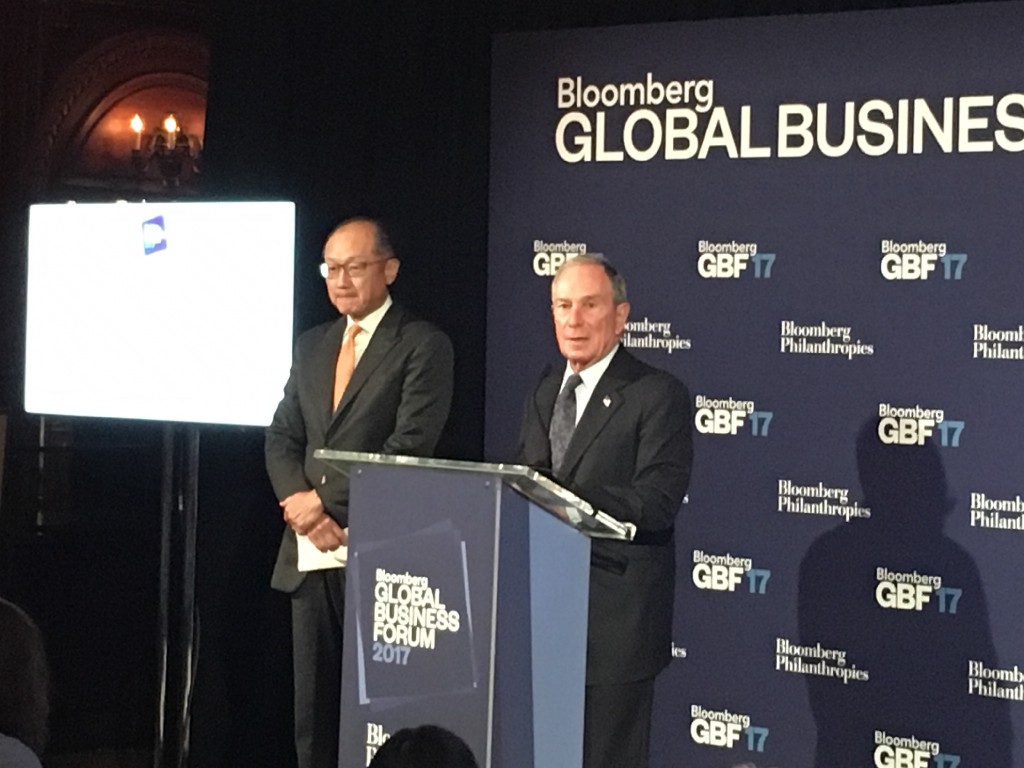Global business and political leaders are mobilizing to fill the leadership void on global challenges from climate change to immigration and inequality.
Case in point: California Governor Jerry Brown and former New York City Mayor Michael Bloomberg will convene a Global Climate Summit in San Francisco next summer to showcase action by corporations, states and cities, in the absence of federal leadership in addressing the climate challenge.
“We have to take [cooperation] to another level, and it depends upon our mind and our heart,” said Bloomberg, the billionaire businessman, as he opened the Bloomberg Global Business Forum. “First believing that we can and must every day expand the definition of ‘us,’ shrink the definition of ‘them.’ We shouldn’t have to have an earthquake or a hurricane to know that that is what we are about.”
With the U.N. General Assembly in session, billionaires and business leaders were all over New York this week to lift ambitions around the 17 U.N. Sustainable Development Goals for economic and social inclusion, climate action and environmental progress. Their collective message: “We got this.”
The emerging center of gravity was Bloomberg’s forum at the Plaza Hotel. At the opening, former president Bill Clinton effectively handed over the role he played until last year through the Clinton Global Initiative, which since 2005 had been held on the sidelines of the U.N. meeting.
The U.S. retreat from leadership on many international issues has in some ways created an equal but opposite reaction. Since President Trump announced the U.S. would leave the Paris agreement, BlackRock, the world’s largest asset manager, says it has experienced the largest ever demand for sustainable investments, said BlackRock CEO Larry Fink. “It’s just physics.”
The U.S. stepping back isn’t a good thing, said Anand Mahindra, chairman of Indian multinational, the Mahindra Group. But the void has his competitive juices flowing. “I’m delighted,” he said, calling sustainable development “the single biggest business opportunity of the next couple decades.”
Arif Naqvi, CEO of private equity firm Abraaj, with $10 billion invested in megacities like Lagos, Nairobi and Mumbai, said, “The plumbing of the global financial system is broken.” Investors are misperceiving risk, he says, and not allocating capital where it can be most productive. “Cross-border capital flows are down 65%…Default rates on U.S. infrastructure projects are 8.5%. Default rates on African infrastructure projects: 1.1%. But investors say Africa is risky.”
World Bank president Jim Kim announced Invest for Climate, an effort to de-risk low-carbon infrastructure investments. The World Bank will use credit enhancements, guarantees, first-loss capital and other financial mechanisms to accelerate the flow of capital to climate solutions.
“There’s about $10 trillion sitting in negative interest rate bonds. Yet there’s a sense that investing in developing and middle income countries…is risky?” said Kim. “There are vast opportunities in developing countries in areas like clean energy and climate-smart agriculture that will lay the groundwork for a more prosperous and sustainable future.”











